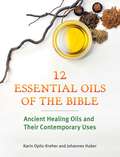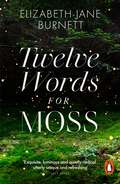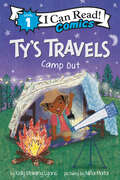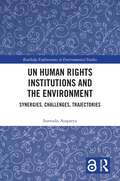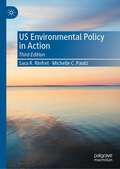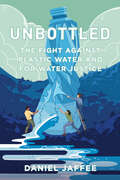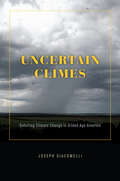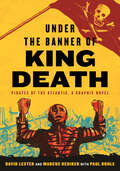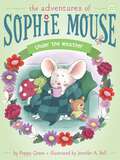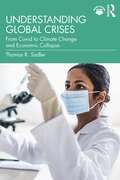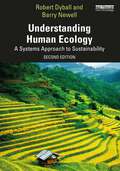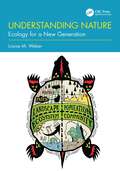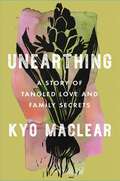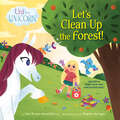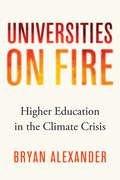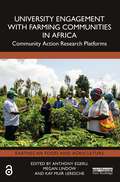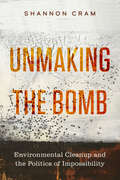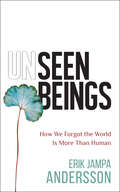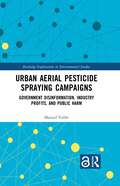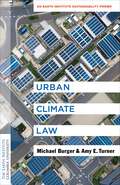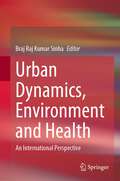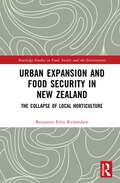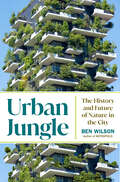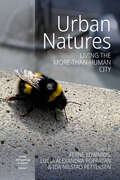- Table View
- List View
Twelve Essential Oils of the Bible: Ancient Healing Oils and Their Contemporary Uses
by Johannes Huber Karin Opitz-KreherA full-color guide to the healing power of the 12 most important essential oils mentioned in the Bible• Explores 12 essential oils: cassia, galbanum, myrrh, myrtle, spikenard, onycha, sandalwood, frankincense, hyssop, cedar, cistus, and cypress• Details, for each oil, its Bible verses, historical information, botanical and chemical components, uses in folk medicine, and modern uses for healing and well-being, including simple recipes and daily practices• Explains how essential oils and herbal medicine played a role in biblical times and in general historyHealth Essential Oils have been used for healing purposes since ancient times. Oils anointed newborns and kings and were employed to care for the body and treat the sick. The Bible specifically mentions at least 33 different essential oils and refers the aromatic herbs, resins, and incense more than a thousand times. Distilling the essence of this healing wisdom, Karin Optiz-Kreher and Johannes Huber explain the ancient uses of essential oils, both for ritualistic and health purposes, and they examine the detail the 12 most important essential oils mentioned in the bible. The essential oils in the full-color guide are cassia, galbanum, myrrh, myrtle, spikenard, onycha, sandalwood, frankincense, hyssop, cedar, cistus, and cypress. Each oil is described, beginning with the Bible verses that refer to it, followed by historical information about the oil, its botanical and chemical components, its uses in folk medicine, and its modern applications for healing and well-being, including simple recipes and daily practices.Learn all you need to know about these powerful oils from the scriptures.
Twelve Words for Moss: Love, Loss And Moss
by Elizabeth-Jane BurnettSHORTLISTED FOR THE JHALAK PRIZE 2024Shortlisted for the Wainwright Prize 2023 for Nature Writing'Exquisite, luminous and quietly radical . . . utterly unique and refreshing' Lucy JonesWhere nothing grows, moss is the spark that triggers new life. Embarking on a journey though landscape, memory and recovery, Elizabeth-Jane Burnett explores this mysterious, ancient marvel of the plant world, meditating on and renaming her favourite mosses – from Glowflake to Little Loss – and drawing inspiration from place, people and language itself. 'Fascinating, subtle and risk-taking . . . Poetry, descriptive-evocative prose, memory, memoir, natural history and more all drift and mingle in strikingly new ways' Robert Macfarlane
Ty's Travels: Camp Out (I Can Read Comics Level 1)
by Kelly Starling LyonsTy makes his I Can Read Comic debut! Featuring a bold comic styling by New York Times bestselling illustrator Niña Mata and a compelling easy-to-read text by Kelly Starling Lyons, this Level One I Can Read Comic is the perfect summertime story for beginning readers! Celebrate Ty’s vivid imagination! Nonstop rain dampens the family’s plans to go camping. But with a boost from Ty, the Camp-Out comes out just fine! Rhythmic text, vibrant art, family love, and Black Boy Joy shine on every page of this camping adventure.Ty’s Travels: Camp-Out is a Level One I Can Read Comic, which means it’s perfect for shared reading with young readers new to graphic novel storytelling. This is a Guided Reading Level (GRL) J.The Ty’s Travels series is much acclaimed-—including a Geisel Honor for Zip, Zoom!
UN Human Rights Institutions and the Environment: Synergies, Challenges, Trajectories (Routledge Explorations in Environmental Studies)
by Sumudu AtapattuThis book presents an in-depth analysis of how UN Human Rights institutions and mechanisms have addressed environmental protection, sustainable development and climate change. Despite the increasing involvement of UN human rights bodies in addressing environmental degradation and climate change, a systematic review of the convergence between human rights and the environment in these bodies has not been carried out. Filing this lacuna, this book surveys the resolutions, general comments, concluding observations, decisions on individual communications and press releases. It identifies principles that have emerged, explores the ways in which human rights Charter-based and treaty-based institutions are interpreting environmental principles and examines how they contribute to the emerging field of human rights and environment. Given the disproportionate effect that polluting activities have on marginalized and vulnerable groups, Atapattu also discusses how these human rights mechanisms have addressed the impact on women, children, indigenous peoples, people with disabilities and racial minorities. Written by a world-renowned expert on human rights and the environment, this book will be of great interest to students and scholars researching and teaching in this important field of study.
US Environmental Policy in Action
by Sara R. Rinfret Michelle C. PautzUS Environmental Policy in Action provides a comprehensive look at the creation, implementation, and evaluation of environmental policy, which is of particular importance in our current era of congressional gridlock, partisanship and polarization, and escalating debates about federal/state relations. With a continued focus on the front lines of environmental policy, Rinfret and Pautz take into account the major changes in the practice of US environmental policy during the Trump and Biden administrations. Providing real-life examples of how environmental policy works rather than solely discussing how congressional action produces environmental laws, this third edition of US Environmental Policy in Action offers a practical approach to understanding contemporary American environmental policy.
Unbottled: The Fight against Plastic Water and for Water Justice
by Daniel JaffeeAn exploration of bottled water's impact on social justice and sustainability, and how diverse movements are fighting back. In just four decades, bottled water has transformed from a luxury niche item into a ubiquitous consumer product, representing a $300 billion market dominated by global corporations. It sits at the convergence of a mounting ecological crisis of single-use plastic waste and climate change, a social crisis of affordable access to safe drinking water, and a struggle over the fate of public water systems. Unbottled examines the vibrant movements that have emerged to question the need for bottled water and challenge its growth in North America and worldwide. Drawing on extensive interviews with activists, residents, public officials, and other participants in controversies ranging from bottled water's role in unsafe tap water crises to groundwater extraction for bottling in rural communities, Daniel Jaffee asks what this commodity's meteoric growth means for social inequality, sustainability, and the human right to water. Unbottled profiles campaigns to reclaim the tap and addresses the challenges of ending dependence on packaged water in places where safe water is not widely accessible. Clear and compelling, it assesses the prospects for the movements fighting plastic water and working to ensure water justice for all.
Uncertain Climes: Debating Climate Change in Gilded Age America
by Joseph GiacomelliUncertain Climes looks to the late nineteenth century to reveal how climate anxiety was a crucial element in the emergence of American modernity. Even people who still refuse to accept the reality of human-induced climate change would have to agree that the topic has become inescapable in the United States in recent decades. But as Joseph Giacomelli shows in Uncertain Climes, this is actually nothing new: as far back as Gilded Age America, climate uncertainty has infused major debates on economic growth and national development. In this ambitious examination of late-nineteenth-century understandings of climate, Giacomelli draws on the work of scientists, foresters, surveyors, and settlers to demonstrate how central the subject was to the emergence of American modernity. Amid constant concerns about volatile weather patterns and the use of natural resources, nineteenth-century Americans developed a multilayered discourse on climate and what it might mean for the nation’s future. Although climate science was still in its nascent stages during the Gilded Age, fears and hopes about climate change animated the overarching political struggles of the time, including expansion into the American West. Giacomelli makes clear that uncertainty was the common theme linking concerns about human-induced climate change with cultural worries about the sustainability of capitalist expansionism in an era remarkably similar to the United States’ unsettled present.
Under the Banner of King Death: Pirates of the Atlantic, a Graphic Novel
by David LesterFeaturing an African American fugitive from bondage, an undercover woman, and &‘outcasts of all nations,&’ an arresting graphic exploration of the resistance and radical vision of18th century piratesA tale of mutiny, bloody battle, and social revolution, Under the Banner of King Death novelizes for the first time the real pirates, an itinerant community of outsiders, behind our legends. This graphic novel breaks new ground in our understanding of piracy and pirate culture, giving us more reasons to love the rebellious and stouthearted marauders of the high seas.Set at the pinnacle of the &“Golden Age&” of Atlantic piracy, this novel follows three unlikely companions, who are sold into servitude on a merchant ship and unwittingly thrust into a voyage of rebellion.They are John Gwin, an African American fugitive from bondage in South Carolina—Ruben Dekker, a common seaman from Amsterdam—And Mark/Mary Reed, an American woman who defies stereotypes by dressing as a man.Mutiny ensues against the tyrannical Captain Skinner, who is thrown overboard to make way for democracy aboard The Night Rambler. The crew&’s new order provides radical social benefits, all based on real, documented practices of contemporary pirate ships: democratic decision-making, a social security net, health and disability insurance, and equal distribution of spoils taken from prize ships.It&’s not long before the London elites enlist a war-hungry captain to take down The Night Rambler and start a war of high society versus high-seas pirates. Adapted from the scholarship and research of historian Marcus Rediker, Under the Banner of King Death will inspire readers with its tale of those on the bottom fighting back and achieving, against all odds, a democratic and egalitarian social order, if only for a short time.
Under the Weather (The Adventures of Sophie Mouse #20)
by Poppy GreenSophie is jealous of the attention her brother gets from their parents while he&’s sick in this twentieth book of The Adventures of Sophie Mouse!When Sophie&’s brother, Winston, gets sick, Sophie feels bad for him…at first. But when she sees how much attention he&’s getting from their parents, she starts to feel something else: jealousy. Sophie normally loves school, but now she wishes she could stay home and play all day like Winston. But when Sophie begins to get the sniffles herself, she realizes she was much better off without them. With easy-to-read language and illustrations on almost every page, the Sophie Mouse chapter books are perfect for beginning readers!
Understanding Global Crises: From Covid to Climate Change and Economic Collapse
by Thomas R. SadlerUnderstanding Global Crises is an innovative and interdisciplinary text that investigates the key contemporary economic, social, and environmental crises and demonstrates their deep interconnection. Contributing to the discussion of large-scale crises, this book provides a conceptual framework to understand the current global landscape. Essential cascading crises topics, such as economic collapse, climate change, racial injustice, domestic violence, and epistemic oppression, are explored in order to equip readers with the clarity to understand global crises, assess policy interventions, and analyze social responses. To achieve future resilience, the book shows that society must recognize various forms of inequality and make policy changes. Each chapter showcases an international case study, covering real-life examples of topics such as climate disinformation, vaccine distribution disparities, environmental racism, and socioeconomic deprivation. Other features of the book include key terms, suggested further reading, and discussion questions, as well as online supplements comprising PowerPoint slides and an instructor’s guide. Understanding Global Crises will be a valuable text to support courses in economics, environmental studies, political science, public health, and social policy.
Understanding Human Ecology: A Systems Approach to Sustainability
by Barry Newell Robert DyballUnderstanding Human Ecology offers a coherent conceptual framework for human ecology – a clear approach for understanding the many systems we are part of and for how we frame and understand the problems we face. Blending natural, social, and cognitive sciences with dynamical systems theory, this key text offers systems approaches that are accessible to all, from the undergraduate student to policymakers and practitioners across government, business, and community. In the first edition, road-tested and refined over a decade of teaching and workshops, the authors built a clear, inspiring, and important framework for anyone approaching the management of complex problems and the transition to sustainability. Fully updated for the second edition, the book now goes further in using systems-thinking principles to explain fundamental processes of change in social–ecological systems. Revised case examples provide a working application of these principles, whilst a new discussion of the hierarchical structure of complex systems is included to guide practical policymaking. This new edition is essential reading for students and scholars of human ecology, environmental ethics, and sustainability studies.
Understanding Nature: Ecology for a New Generation
by Louise M. WeberUnderstanding Nature is a new kind of ecology textbook: a straightforward resource that teaches natural history and ecological content, and a way to instruct students that will nurture both Earth and self. While meeting the textbook guidelines set forth by the Ecological Society of America, Understanding Nature has a unique ecotherapy theme, using a historical framework to teach ecological theory to undergraduates. This textbook presents all the core information without being unnecessarily wordy or lengthy, using simple, relatable language and discussing ecology in ways that any student can apply in real life. Uniquely, it is also a manual on how to improve one’s relationship with the Earth. This is accomplished through coverage of natural history, ecology, and applications, together with suggested field activities that start each chapter and thinking questions that end each chapter. The book includes traditional ecological knowledge as well as the history of scientific ecological knowledge. Understanding Nature teaches theory and applications that will heal the Earth. It also teaches long-term sustainability practices for one’s psyche. Professor Louise Weber is both an ecologist and a certified ecopsychologist, challenging ecology instructors to rethink what and how they teach about nature. Her book bridges the gap between students taking ecology to become ecologists and those taking ecology as a requirement, who will use the knowledge to become informed citizens.
Unearthing: A Story of Tangled Love and Family Secrets
by Kyo MaclearAn unforgettable memoir about a family secret revealed by a DNA test, the lessons learned in its aftermath, and the indelible power of love—for readers of Dani Shapiro&’s Inheritance and Katherine May&’s Wintering. &“Magnificent...I will never forget it.&” —Dani Shapiro, author of Inheritance &“A mind-altering and supremely generous exploration of kinship, selfhood, memory, and the roots we share across time, space and species.&” —Naomi Klein, author of This Changes EverythingThree months after Kyo Maclear&’s father dies in December 2018, she gets the results of a DNA test showing that she and the father who raised her are not biologically related. Suddenly Maclear becomes a detective in her own life, unravelling a family mystery piece by piece, and assembling the story of her biological father. Along the way, larger questions arise: what exactly is kinship? And what does it mean to be a family? Unearthing is a captivating and propulsive story of inheritance that goes beyond heredity. Infused with moments of suspense, it is also a thoughtful reflection on race, lineage, and our cultural fixation on recreational genetics. Readers of Michelle Zauner&’s bestseller Crying in H Mart will recognize Maclear&’s unflinching insights on grief and loyalty, and keen perceptions into the relationship between mothers and daughters. What gets planted, and what gets buried? What role does storytelling play in unearthing the past and making sense of a life? Can the humble act of tending a garden provide common ground for an inquisitive daughter and her complicated mother? As it seeks to answer these questions, Unearthing bursts with the very love it seeks to understand.
Uni the Unicorn: Let's Clean Up the Forest! (Uni the Unicorn)
by Amy Krouse RosenthalNew York Times bestseller Uni the Unicorn learns the importance of cleaning up! Bonus: Includes a special DIY craft kids can make at home.Celebrate the magic of believing with Uni the unicorn! Uh-oh! Uni and the little girl find a trail of candy wrappers on the forest floor. These don't belong here! Ride along as they clean up the mess and teach a valuable lesson about litter at the same time.These new Uni the Unicorn paperback storybooks have a strong magical theme and a hopeful message. In Uni's beautiful world, we see Uni experiencing real-world feelings that kids can identify with and families want to read about.
Universities on Fire: Higher Education in the Climate Crisis
by Bryan AlexanderScientists agree that we are on the precipice of a global climate crisis. How will it transform colleges and universities?In 2019, intense fires in the San Francisco Bay Area closed universities and drove afflicted people to shelter at other campuses. At the same time, extraordinary fires ravaged eastern Australia. Several universities responded by promising material and research support to damaged businesses while also hosting refugees and emergency response teams in student residence halls. This was an echo of the devastation wreaked by Hurricane Katrina on Tulane University in 2005.In Universities on Fire, futurist Bryan Alexander explores higher education during an age of unfolding climate crisis. Powered by real-world examples and the latest research, Alexander assesses practical responses and strategies by surveying contemporary programs and academic climate research from around the world. He establishes a model of how academic institutions may respond and offers practical pathways forward for higher education. How will the two main purposes of education—teaching and research—change as the world heats up? Alexander positions colleges and universities in the broader social world, from town-gown relationships to connections between how campuses and civilization as a whole respond to this epochal threat.Current studies of climate change trace the likely implications across a range of domains, from agriculture to policy, urban design, technology, culture, and human psychology. However, few books have predicted or studied the effects of the climate crisis on colleges and universities. By connecting climate research to a deep, futures-informed analysis of academia, Universities on Fire explores how climate change will fundamentally reshape higher education.
University Engagement with Farming Communities in Africa: Community Action Research Platforms (Earthscan Food and Agriculture)
by Anthony EgeruThis book explains and explores how collaborations can be built and strengthened between African universities and farming communities to address real-world contemporary challenges. The book focuses on Community Action Research Platforms, an approach that has successfully enabled African universities to break free of the ivory tower and prove their relevance to society through deep collaborative engagements in targeted agricultural value chains. Developed in a pan-African network of universities (RUFORUM) focused on capacity building in agriculture, the approach has been tested in diverse settings over the last 15 years. The book draws on the experiences and lessons from 21 different projects initiated by RUFORUM member universities in Benin, Botswana, Ethiopia, Ghana, Kenya, Malawi, Namibia, South Africa, Sudan, Tanzania, Uganda and Zimbabwe. It highlights a critical yet underutilised role for African universities as collaborators and catalysts for multisector solutions. These are solutions that increase productivity and address climate change. They develop livelihoods and resilience in rural communities, as well as promote farmers’ access to markets, innovation and trade while safeguarding biodiversity and enhancing food and nutrition security. The book makes a case for repositioning African universities as fulcrums of development in society. It shares the rich experiences, learnings and scientific findings of diverse researchers, practitioners and students who have been working towards achieving this reality on the ground. This multidisciplinary book holds appeal for university leaders, higher education, agrifood and development specialists, researchers and practitioners, policymakers and development agencies engaged in African agriculture and rural development, higher education and sustainable growth.
Unmaking the Bomb: Environmental Cleanup and the Politics of Impossibility (Critical Environments: Nature, Science, and Politics #14)
by Shannon CramWhat does it mean to reckon with a contaminated world? In Unmaking the Bomb, Shannon Cram considers the complex social politics of this question and the regulatory infrastructures designed to answer it. Blending history, ethnography, and memoir, she investigates remediation efforts at the Hanford Nuclear Reservation, a former weapons complex in Washington State. Home to the majority of the nation's high-level nuclear waste and its largest environmental cleanup, Hanford is tasked with managing toxic materials that will long outlast the United States and its institutional capacities. Cram examines the embodied uncertainties and structural impossibilities integral to that endeavor. In particular, this lyrical book engages in a kind of narrative contamination, toggling back and forth between cleanup's administrative frames and the stories that overspill them. It spends time with the statistical people that inhabit cleanup's metrics and models and the nonstatistical people that live with their effects. And, in the process, it explores the uneven social relations that make toxicity a normative condition.
Unseen Beings: How We Forgot the World Is More Than Human
by Erik Jampa Andersson'Unseen Beings is a magnificent, passionate, brilliantly written manifesto for our urgent reimagining of our relationship with every aspect of the creation… indispensable reading for anyone who longs for a just and balanced human future. Buy it and give it to everyone you know.' Andrew Harvey, author of The Hope A revolutionary perspective on the climate catastrophe bridging history, philosophy, science, and religion.You&’ve heard the hard-hitting data and you&’ve seen the documentaries. But what will it truly take for humanity to change? We will not tackle the climate catastrophe with data alone – we need new stories and new ways of seeing and thinking.By drawing on traditional eco-philosophies and Buddhist wisdom, Erik Jampa Andersson offers an approach to our environmental emergency that will make us rethink the very nature of our existence on this incredible planet. Looking at the climate catastrophe through the framework of disease, Unseen Beings examines our ecological diagnosis, its historical causes and conditions and, crucially, its much-needed treatment, as well as exploring:how and why we constructed a human-centric worldview amazing recent discoveries around non-human intelligencehow religious traditions have dealt with questions of nature, sentience and ecologycritical connections between human health and environmental healthThis book is a call to action. Climate anxiety has left many of us feeling confused and powerless, but there is another way. If we can recover our natural sense of enchantment and kinship with non-human beings, we may still find a path to build a better future.
Urban Aerial Pesticide Spraying Campaigns: Government Disinformation, Industry Profits, and Public Harm (Routledge Explorations in Environmental Studies)
by Manuel ValléeThis book examines social processes that have contributed to growing pesticide use, with a particular focus on the role governments play in urban aerial pesticide spraying operations. Beyond being applied to sparsely populated farmland, pesticides have been increasingly used in densely populated urban environments, and when faced with invasive species, governments have resorted to large-scale aerial pesticide spraying operations in urban areas. This book focuses on New Zealand's 2002–2004 pesticide campaign to eradicate the Painted Apple Moth, which is the largest operation of its kind in world history, whether we consider its duration (29 months), its scope (at its peak the spraying zone was 10,632 hectares/26,272 acres), the number of sprayings that were administered (the pesticide was administered on 60 different days), or the number of people exposed to the spraying (190,000+). This book provides an in-depth understanding of the social processes that contributed to the incursion, why the government sought to eradicate the moth through aerial pesticide spraying, the ideological strategies they used to build and maintain public support, and why those strategies were effective. Urban Aerial Pesticide Spraying Campaigns will be of great interest to students and researchers of pesticides, environmental sociology, environmental history, environmental studies, political ecology, geography, medical sociology, and science and technology studies.
Urban Aerial Pesticide Spraying Campaigns: Government Disinformation, Industry Profits, and Public Harm (Routledge Explorations in Environmental Studies)
by Manuel ValléeThis book examines social processes that have contributed to growing pesticide use, with a particular focus on the role governments play in urban aerial pesticide spraying operations.Beyond being applied to sparsely populated farmland, pesticides have been increasingly used in densely populated urban environments, and when faced with invasive species, governments have resorted to large-scale aerial pesticide spraying operations in urban areas. This book focuses on New Zealand's 2002–2004 pesticide campaign to eradicate the Painted Apple Moth, which is the largest operation of its kind in world history, whether we consider its duration (29 months), its scope (at its peak the spraying zone was 10,632 hectares/26,272 acres), the number of sprayings that were administered (the pesticide was administered on 60 different days), or the number of people exposed to the spraying (190,000+). This book provides an in-depth understanding of the social processes that contributed to the incursion, why the government sought to eradicate the moth through aerial pesticide spraying, the ideological strategies they used to build and maintain public support, and why those strategies were effective.Urban Aerial Pesticide Spraying Campaigns will be of great interest to students and researchers of pesticides, environmental sociology, environmental history, environmental studies, political ecology, geography, medical sociology, and science and technology studies.The Open Access version of this book, available at http://www.taylorfrancis.com, has been made available under a Creative Commons Attribution-Non Commercial-No Derivatives (CC-BY-NC-ND) 4.0 license.
Urban Climate Law: An Earth Institute Sustainability Primer (Columbia University Earth Institute Sustainability Primers)
by Michael Burger Amy E. TurnerCities have taken a leading role in efforts to reduce greenhouse gas emissions. As federal and state climate policy waxes and wanes, many of the largest U.S. cities have pledged themselves to ambitious sustainability goals, as have smaller communities across the country. City-level policy makers, facing a range of political constraints, a thicket of federal and state laws, and varying degrees of municipal authority, need to figure out how to meet their climate commitments.Urban Climate Law is a practical, user-friendly primer on the legal challenges and opportunities for effective and equitable decarbonization. Michael Burger and Amy E. Turner—leading experts in local climate law and policy—examine the key issues surrounding climate mitigation policies across the buildings, transportation, waste, and energy sectors, with an emphasis on environmental justice. They explore the legal frameworks and factors that can constrain or enable various approaches at the municipal level. Burger and Turner clearly and accessibly present complex legal topics like preemption, federal statutes such as the Clean Air Act, and constitutional law for readers without legal backgrounds, including students, advocates, officials, and other practitioners. Aimed at a nonspecialist audience, this book provides concise and comprehensible answers to the core questions cities confront when seeking to develop legally sound local climate policy.
Urban Dynamics, Environment and Health: An International Perspective
by Braj Raj Kumar SinhaThe comprehensive volume focuses on spatial, temporal, conceptual and empirical approaches to various elements of urban dynamics, environment and urban health. It demonstrates a multidisciplinary account of the significant dimensions of urbanization and urban life. Chapters by leading international experts are presented in sections on urban dynamics, Urban Environmental Issues, Urban Health Problems and Urban Development, Planning and Policies. Each chapter provides a breadth of information on conceptual and empirical studies of urban issues. It enables the readers to understand the interconnections of various vital elements of each urban-related topical issue locally, regionally and globally. Extensive maps, charts, diagrams and tables as cartographic tools facilitate the reader’s understanding. It also outlines an action plan for policy program change in both the developed and less developed countries toward sustainable urban development and environment for better health, prosperity and quality of life of the present and future urban population. It is an indispensable reference for students, research scholars of geography and environmental, medical, and social sciences at undergraduate and postgraduate levels.
Urban Expansion and Food Security in New Zealand: The Collapse of Local Horticulture (Routledge Studies in Food, Society and the Environment)
by Benjamin Felix RichardsonThis book examines suburban development in New Zealand and its conflict with and impact on local horticulture and food security. Drawing on an ethnographic study of Auckland’s rapidly expanding urban periphery, combined with comparative case studies from California in the USA and Victoria in Australia, the book examines how the profit-making strategies of property developers and landowners drastically reshapes work and life at the edge of cities. With a significant portion of the world's croplands lying adjacent to cities, the accelerating pace of urban sprawl across the planet places unprecedented pressure on the productivity and even existence of these vital food bowl regions. The book examines how the demand for more land for development at the urban periphery collides with concerns over local food security and the protection of ecosystem services. It analyses land use policy, historical records, and physical patterns of development, alongside participant observation of local events. It combines this with interviews with government officials, property developers, landowners, local residents and horticulturists. By combining these narratives of the hectic and lucrative business of suburban property development with the collapse of local horticulture, this book shows how the realignment of the New Zealand's interests of financial profitability over other concerns led to the transformation of urban peripheries from a productive food bowl to an investment vehicle. This book will be of great interest to students and scholars of urban food and agriculture, urban planning and development and rural-urban studies.
Urban Jungle: The History and Future of Nature in the City
by Ben WilsonIn this exhilarating look at cities, past and future, Ben Wilson proposes that, in our world of rising seas and threatening weather, the natural world may prove the city's savior.Since the beginning of civilization, humans have built cities to wall nature out, then glorified it in beloved but quite artificial parks. In Urban Jungle Ben Wilson—the author of Metropolis, a seven-thousand-year history of cities that the Wall Street Journal called &“a towering achievement&”—looks to the fraught relationship between nature and the city for clues to how the planet can survive in an age of climate crisis.Whether it was the market farmers of Paris, Germans in medieval forest cities, or the Aztecs in the floating city of Tenochtitlan, pre-modern humans had an essential bond with nature. But when the day came that water was piped in and food flown from distant fields, that relationship was lost. Today, urban areas are the fastest-growing habitat on Earth and in Urban Jungle Ben Wilson finds that we are at last acknowledging that human engineering is not enough to protect us from extremes of weather. He takes us to places where efforts to rewild the city are under way: to Los Angeles, where the city&’s concrete river will run blue again, to New York City, where a bleak landfill will be a vast grassland preserve. The pinnacle of this strategy will be Amsterdam: a city that is its own ecosystem, that makes no waste and produces its own energy. In many cities, Wilson finds, nature is already thriving. Koalas are settling in Brisbane, wild boar may raid your picnic in Berlin. Green canopies, wildflowers, wildlife: the things that will help cities survive, he notes, also make people happy.Urban Jungle offers the pleasures of history—how backyard gardens spread exotic species all over the world, how war produces biodiversity—alongside a fantastic vision of the lush green cities of our future. Climate change, Ben Wilson believes, is only the latest chapter in the dramatic human story of nature and the city.
Urban Natures: Living the More-than-Human City (Urban Anthropology Unbound #1)
by Ida Nilstad Pettersen Ferne Edwards, Lucia Alexandra PopartanEfforts to create greener urban spaces have historically taken many forms, often disorganized and undisciplined. Recently, however, the push towards greener cities has evolved into a more cohesive movement. Drawing from multidisciplinary case studies, Urban Natures examines the possibilities of an ethical lively multi-species city with the understanding that humanity’s relationship to nature is politically constructed. Covering a wide range of sectors, cities, and urban spaces, as well as topics ranging from edible cities to issues of power, and more-than-human methodologies, this volume pushes our imagination of a green urban future.
